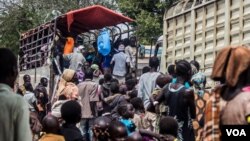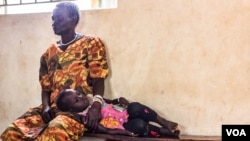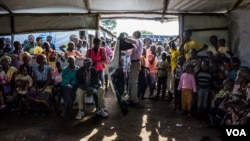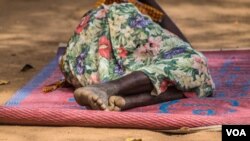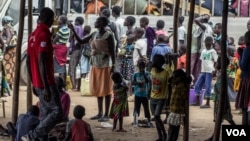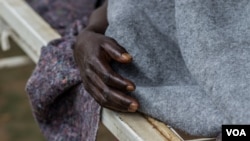Once a safe haven for those trying to escape South Sudan’s conflict, Yei is the latest town to be engulfed by violence in the country’s civil war.
In Yei, the population often falls asleep to gunfire and wakes up to soldiers patrolling the streets. The army, made up primarily of soldiers belonging to the Dinka ethnic group of President Salva Kiir, controls all roads leading out of town.
One hundred thousand people are believed to be trapped inside the city. Another 150,000 have fled, with many heading across the border for Uganda, to the south.
Civilians who have fled Yei and arrived in the Ugandan refugee camps tell of kidnappings, abuses and disappearances taking place inside Yei and along the road between South Sudan and the Ugandan border.
In Yei, “people are dying like insects,” says Michael Ayume, a newly arrived refugee in Uganda, and the leader of a Yei merchants’ organization.
In September, 75 boda boda drivers from Yei were arrested by government troops, he says. A boda is a small motorbike and a common form of transportation in South Sudan.
“These guys, they were just young men doing their business,” says Ayume. “Twenty-one were later released. The others? We never saw them again.”
An oasis from war shattered
Until the middle of this year, Yei was largely spared the violence that has ravaged South Sudan since December 2013, when fighting erupted between supporters of President Kiir and his former deputy, Riek Machar.
Then, in August, government forces -- soldiers from the Sudan People’s Liberation Army (SPLA) -- entered Yei, a town surround by farmland in the country’s south. The soldiers were looking for rebels -- members of the the Sudan People’s Liberation Movement-in-Opposition (the “IO”).
They didn’t find any SPLM-IO members, but did encounter local forces that resisted the offensive.
Soon, Yei was witness to heavy fighting and attacks on civilians in Yei and the surrounding villages intensified.
A report by Human Rights Watch this week says that both sides have committed serious abuses, including arbitrary arrests, torture and sexual abuse, against civilians in and around Yei.
A spokesperson for South Sudan’s armed forces, Lul Ruai Koang, denied the SPLA is responsible for any abuses against civilians in Yei. The local forces do not have a spokesperson and have not issued any statement.
In recent weeks, 2,000 people per day have crossed the border into northern Uganda, according to the United Nations refugee agency, UNHCR. Many of the refugees are women and children.
One of those women is Joy, a 28-year-old who left Yei for Uganda with her daughter in August.
Only a few kilometers from the border, the car carrying Joy and several others fleeing Yei was stopped by government soldiers.
“The Dinka men stopped the car and asked us to get out. They would not allow us to leave. We had to abandon the car and hide in the bush,” she says.
Joy was able to get across the border, but on foot.
“My husband is still in Yei,” she says. “He can’t move anywhere. The roads are blocked. I don’t know when I will see him again.”
No plans to return
Prospects for peace in Yei and the rest of South Sudan are looking grim at the moment.
Efforts to end the civil war appear to be making no progress. A power sharing agreement signed in Ethiopia in August 2015 has been violated numerous times. Fighting that broke out around the presidential palace in Juba in July prompted a newly-returned Machar to flee the country for the Democratic Republic of Congo.
Last week, United Nations Secretary-General Ban Ki-moon warned that the U.N. peacekeeping force to South Sudan, known as UNMISS, lacks the resources to protect the population.
And the U.N. special advisor for genocide, Adama Dieng, warned of a potential for genocide in South Sudan.
Across the border in Uganda, Joy doesn’t think she will return to South Sudan any time soon.
“We are tired of this war,” she says. “I think of my daughter. What future she will have in South Sudan?




